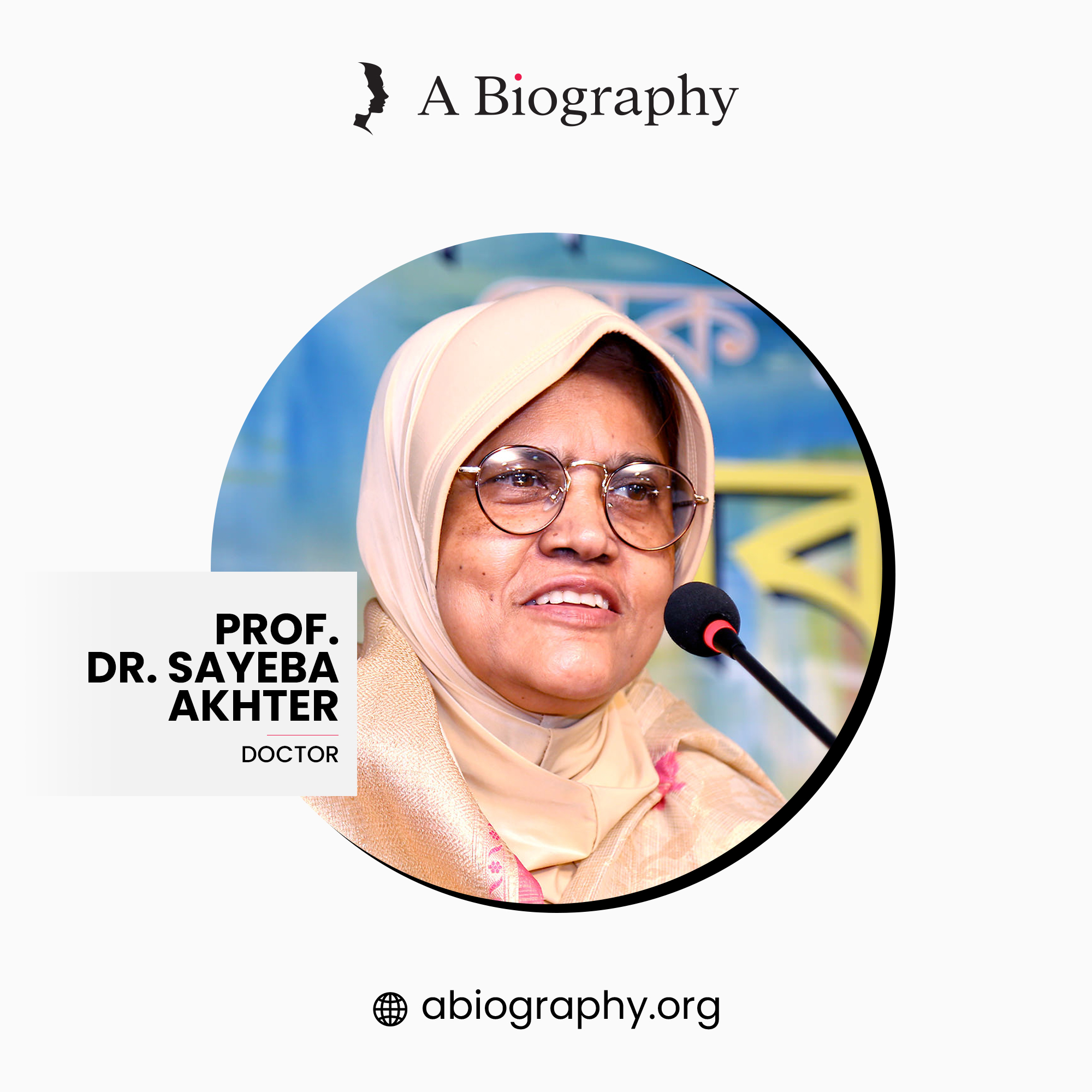A BIOGRAPHY OF
PROF. DR. SAYEBA AKHTER
(Gynecology, Obstetrics Specialist & Surgeon)
A BIOGRAPHY OF PROF. DR. SAYEBA AKHTER
Prof. Dr. Sayeba Akhter is a Gynecologist in Dhaka who was born in 1953. Her qualification is MBBS, FCPS (OBGYN), FCPS (PAK), FICMCH (IN), DRH (UK). She is a Former Professor in the Department of Gynecology & Obstetrics at Bangabandhu Sheikh Mujib Medical University Hospital. She regularly provides treatment to her patients.
She has devoted her professional life to eradicating obstetric fistula. She has held the position of president of the Obstetrics and Gynecology Society of Bangladesh and is currently a member of the executive committee of the International Society of Obstetric Fistula Surgeons. She is the director of two nonprofit organizations that support the education of disadvantaged girls in Gaibandha and Dhaka.
In 2020, the Bangladeshi government presented her the Ekushey Padak, the nation’s second-highest civilian honor, in honour of her contributions to medicine.
Table of Contents
ToggleLife of “Prof. Dr. Sayeba Akhter” At a Glance:
- Born: 1953
- Known For :
- Obstetrics
- Gynaecology
- Obstetric Fistula Specialist
- Speciality: Obstetrics and Gynecology
- Father: M A Malek and
- Mother: Mahmuda Khatun
- Education:
- MBBS
- FCPS (OBGYN)
- FCPS (PAK)
- FICMCH (IN)
- DRH (UK)
- Institution: Dhaka Medical College and Hospital
- Alma Mater: Chittagong Medical College
- Notable Awards:
- Ekushey Padak (2020)
- Anannya Top Ten Awards
- Mother Teresa Awards
Early Life and Education:
Sayeba Akhter was born in 1953 in Chittagong. Her father was M A Malek and mother was Mahmuda Khatun. She has stated that the commitment of the physicians she encountered throughout her medical studies encouraged her to help young moms. She completed her medical degree from Chittagong Medical College.
Research and career
She was the Head of the Obstetrics and gynaecology Department at Dhaka Medical College and Hospital. In 2000, Sayeba Akhter used a catheter and a condom to make a low-cost uterine balloon tamponade (UBT). About 40% of maternal mortality in Bangladesh at the time she developed the UBT were caused by postpartum hemorrhage. She developed the UBT, which has a total price of less than $5, to stop bleeding after childbirth.
Her technology has had a substantial influence on women’s health globally, protecting moms from enduring postpartum hemorrhage. The technique, which became known as Saeyba’s Method, has been taught to medical professionals and midwives in underdeveloped nations.
Bangladesh has a high rate of child brides who are not physically capable of giving birth, which contributes to the prevalence of obstetric fistula. Young women face social shame when seeking assistance in addition to being physically unprepared, and there is a dearth of doctors with the necessary training. At the Dhaka Medical College and Hospital, Akhter established a national center in 2005 where she taught medical professionals how to close fistulas. After researching the Addis Ababa Fistula Hospital in Ethiopia, she founded the center in partnership with the UNFPA Campaign to End Fistula.
The program was supported by the Islamic Development Bank and began with a month of training. The center provided care for around 400 patients between 2005 and 2011 and taught them how to generate money once they were discharged from the hospital. She lost her job at Bangabandhu Sheikh Mujib Medical University in 2009. Akhter officially founded MAMM’s Institute of Fistula and Women’s Health (MIFWOH) in 2012.
She was chosen to lead the Obstetrics and Gynecology Society of Bangladesh in 2008. She joined the Committee for Genital Trauma of the International Federation of Gynecology and Obstetrics (FIGO) shortly after that and has been actively associated with it ever since. Together, they created the FIGO Global Competency-Based Fistula Surgery Training Manual and the Fistula Surgery Training Initiative. Only one out of every fifty women gets access to a skilled surgeon due to a lack of specialized surgeons. Along with enhancing the capabilities of Bangladesh’s medical professionals, Akhter has collaborated with the Bangladeshi government to lessen the incidence of obstetric fistula. The Bangladeshi government increased the legal age for marriage in 2017, which required that women be older than eighteen.
It was revealed in 2019 that Akhter and FIGO had educated more than 50 surgeons who had performed more than 7,500 repair procedures throughout Asia and Africa.
Sayeba Akhter has recently worked with Rohingya refugees from Myanmar who have moved to Bangladesh. Few Rohingya women and girls have access to family planning, cleanliness, and maternity health services.
Awards and Honours:
Sayeba Akhter has won several awards and honours, including
The Anannya Top Ten Awards
Women Super Achiever Award
Mother Teresa Awards and
Lifetime Achievement Award
She holds an honorary Fellowship of
The Royal College of Obstetricians and Gynaecologists
The Indian College of Maternal and Child Health
The College of Physicians and Surgeons Pakistan and
The Indian Academy of Obstetrics & Gynaecology.
Government of Bangladesh awarded her the country’s second highest civilian award Ekushey Padak in 2020 Young Scientist Award: For the best research work received Young Scientist Award from Asia Oceania Federation of Obstetrics and Gynaecology (AOFOG) in 2005. The first and only one in Bangladesh.
Disclaimer:
All content on this website is provided in good faith and only for general information purposes. A Biography makes no guarantees regarding the information’s completeness, reliability, or correctness. Any action you take as a result of the material on this website is entirely at your own risk. A Biography is not responsible for any losses or damages incurred as a result of using our website.

